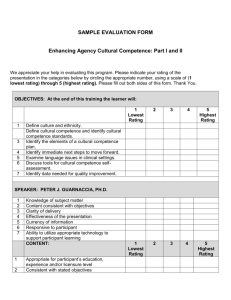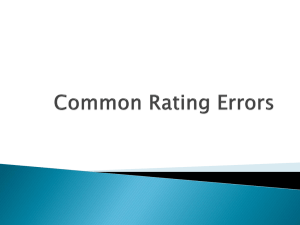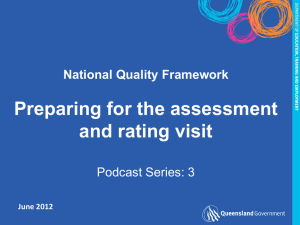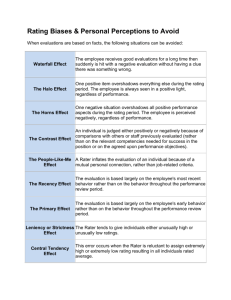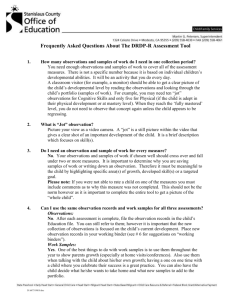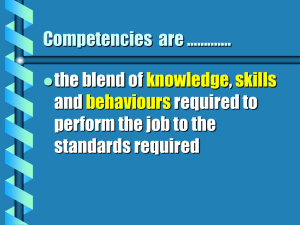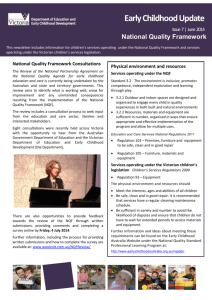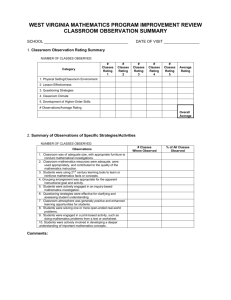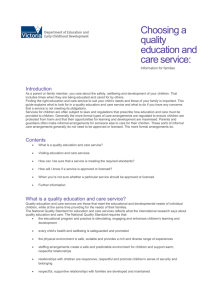Preparing for the assessment and rating visit
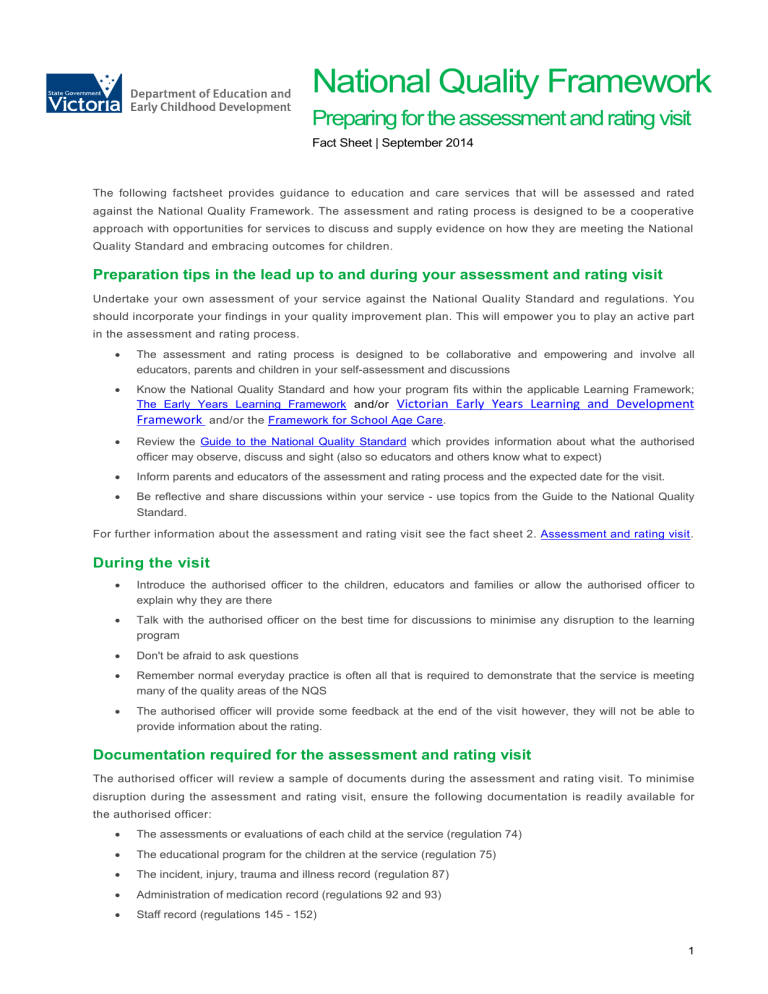
National Quality Framework
Preparing for the assessment and rating visit
Fact Sheet | September 2014
The following factsheet provides guidance to education and care services that will be assessed and rated against the National Quality Framework. The assessment and rating process is designed to be a cooperative approach with opportunities for services to discuss and supply evidence on how they are meeting the National
Quality Standard and embracing outcomes for children.
Preparation tips in the lead up to and during your assessment and rating visit
Undertake your own assessment of your service against the National Quality Standard and regulations. You should incorporate your findings in your quality improvement plan. This will empower you to play an active part in the assessment and rating process.
The assessment and rating process is designed to be collaborative and empowering and involve all educators, parents and children in your self-assessment and discussions
Know the National Quality Standard and how your program fits within the applicable Learning Framework;
The Early Years Learning Framework and/or
Victorian Early Years Learning and Development
Framework
and/or the Framework for School Age Care .
Review the Guide to the National Quality Standard which provides information about what the authorised officer may observe, discuss and sight (also so educators and others know what to expect)
Inform parents and educators of the assessment and rating process and the expected date for the visit.
Be reflective and share discussions within your service - use topics from the Guide to the National Quality
Standard.
For further information about the assessment and rating visit see the fact sheet 2. Assessment and rating visit .
During the visit
Introduce the authorised officer to the children, educators and families or allow the authorised officer to explain why they are there
Talk with the authorised officer on the best time for discussions to minimise any disruption to the learning program
Don't be afraid to ask questions
Remember normal everyday practice is often all that is required to demonstrate that the service is meeting many of the quality areas of the NQS
The authorised officer will provide some feedback at the end of the visit however, they will not be able to provide information about the rating.
Documentation required for the assessment and rating visit
The authorised officer will review a sample of documents during the assessment and rating visit. To minimise disruption during the assessment and rating visit, ensure the following documentation is readily available for the authorised officer:
The assessments or evaluations of each child at the service (regulation 74)
The educational program for the children at the service (regulation 75)
The incident, injury, trauma and illness record (regulation 87)
Administration of medication record (regulations 92 and 93)
Staff record (regulations 145 - 152)
1
Children’s attendance records for centre-based services (regulation 158 and 159)
Children’s enrolment records (regulation 160 and regulations 99, 102, 161, and 162)
The service
’s policies and procedures (regulation 168 and regulations 90 and 97)
Evidence of prescribed insurance (regulation 180).
Additional requirements for family day care services:
Register of family day care educators (regulation 153)
Records of staff, family day care educators, family day care coordinators and family day care educator assistants (regulation 154)
Record of visitors (regulation 165)
The additional policies and procedures for family day care services (regulation 169).
Resources available
The following resources can be accessed on the ACECQA website:
The Guide to Assessment and Rating for Services
The National Quality Standard Assessment and Rating Instrument
National Quality Framework Resource Kit :
Guide to the National Quality Framework
Guide to the National Law and National Regulations
Guide to the National Quality Standard
Guide to Developing a Quality Improvement Plan
The following fact sheets provide further information about the assessment and rating process and are available on the Department’s website :
About the assessment and rating process.
Assessment and rating process
Assessment and rating visit
After the assessment and rating visit
Required policies and procedures (regulation 168)
Policies and procedures must be available at the service and readily accessible to all educators, staff, volunteers, families and for inspection by the Department. Reasonable steps must be taken to ensure that the service’s policies and procedures are followed.
Further information about the required policies and procedures can be accessed on page 109 and 110 of the
Guide to the Education and Care Services National Law and the Education and Care Services National
Regulations 2011 .
Prescribed information to be displayed (section 172 and regulation 173)
The prescribed information must be displayed at an approved service premises so that it is clearly visible from the main entrance to the service.
Further information about the prescribed information to be displayed can be accessed at page111 of the
Guide to the Education and Care Services National Law and the Education and Care Services National
Regulations 2011 .
2
It’s important to keep your contact details up-to-date
On commencement of the assessment and rating cycle the approved provider will be supplied with information held on the National Quality Agenda IT System (NQA ITS) about their service. If these details require updating the approved provider should change the contact details by completing the relevant forms;
PA08 Notification of change to information about approved provider; or
SA12 Notification of change of information about an approved service
To do this, approved providers must be registered for NQA ITS and can do this at the ACECQA website at: http://www.acecqa.gov.au/national-quality-agenda-it-system .
ACECQA provides technical support for services experiencing issues with registering, linking, accessing or general error messages while using NQA ITS. The NQA ITS service desk can be contacted on 1300 667 319 or via email at nqaits@acecqa.gov.au
Further information
The Au stralian Children’s Education and Care Quality Authority
(ACECQA) is the national, independent statutory authority governing the National Quality Framework.
Phone: 1300 422 327
Email enquiries@acecqa.gov.au
Web: www.acecqa.gov.au
The Department of Education and Early Childhood Development is the Regulatory Authority in Victoria.
Phone: 1300 307 415
Email: licensed.childrens.services@edumail.vic.gov.au
Web: www.education.vic.gov.au/childhood/providers/regulation
3
